| Listing 1 - 10 of 36 | << page >> |
Sort by
|
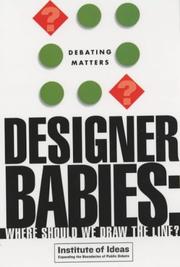

ISBN: 0340848359 Year: 2007 Publisher: London Hodder and Stoughton
Abstract | Keywords | Export | Availability | Bookmark
 Loading...
Loading...Choose an application
- Reference Manager
- EndNote
- RefWorks (Direct export to RefWorks)
Science fiction has been preoccupied with technologies to control the characteristics of our children since the publication of Aldous Huxley's "Brave New World". Current arguments about "designer babies" almost always demand that lines should be drawn and regulations tightened. But where should regulation stop and patient choice in the use of reproductive technology begin? In this book, five contributors set out their arguments. In this text, contrasting approaches to this topical and contentious question are presented by various specialists on the subject. The Institute of Idea's mission is to expand the boundaries of public debate through organizing conferences, discussions and salons, and publishing written conversations and exchanges in a hope to play a part in shaking up a culture that seems to shy away more and more from confrontation and the clash of ideas. This series aims to present thought-provoking arguments.
designerbaby (redderbaby) --- reproductieve technologie (voortplantingstechnologie, medisch begeleide voortplanting, MBV, artificiële voortplanting, kunstmatige voortplanting) --- enfant médicaments --- technique de reproduction (technique de procréation, procréation médicalement assistée, PMA, procréation artificielle)
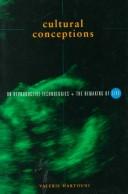
ISBN: 0816626235 0816626227 Year: 1997 Publisher: Minneapolis University of Minnesota press
Abstract | Keywords | Export | Availability | Bookmark
 Loading...
Loading...Choose an application
- Reference Manager
- EndNote
- RefWorks (Direct export to RefWorks)
reproductieve technologie (voortplantingstechnologie, medisch begeleide voortplanting, MBV, artificiële voortplanting, kunstmatige voortplanting) --- technique de reproduction (technique de procréation, procréation médicalement assistée, PMA, procréation artificielle) --- Human reproductive technology --- Moral and ethical aspects --- Social aspects
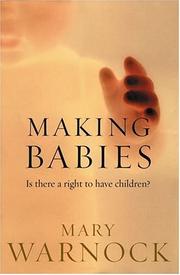
ISBN: 0192803344 0192805002 9780192803344 Year: 2002 Publisher: Oxford Oxford university press
Abstract | Keywords | Export | Availability | Bookmark
 Loading...
Loading...Choose an application
- Reference Manager
- EndNote
- RefWorks (Direct export to RefWorks)
Mary Warnock studies the issues underlying reproductive technologies. She analyses what it means to claim something as a 'right' and discusses the cases of different groups of people. She examines the ethical problems faced by types of assisted reproduction and argues that human cloning may be a viable form of treatment for infertility. The development of new reproductive technologies has raised urgent questions and debates about how and by whom these treatments should be controlled. On the one hand individuals and groups have claimed access to assisted reproduction as a right, and some have also claimed that this access should be available free of charge. As well as clinically infertile heterosexual couples, this right has been claimed by single women, gay couples, post-menopausal women, and couples who wish to delay having children for various reasons. Others have argued that a desire to have children does not make it a human right, and, moreover, that there are some people who should not be assisted to become parents, on grounds of age, sexuality, or lifestyle. Mary Warnock steers a clear path through the web of complex issues underlying these views. She begins by analyzing what it means to claim something as a 'right', and goes on to discuss the cases of different groups of people. She also examines the ethical problems faced by particular types of assisted reproduction, including artificial insemination, in-vitro fertilization, and surrogacy, and argues that in the future human cloning may well be a viable and acceptable form of treatment for some types of infertility.
Reproductive technology --- Human reproductive technology --- Moral and ethical aspects. --- Moral and ethical aspects --- #GBIB:CBMER --- -Human reproductive technology --- -reproductieve technologie (voortplantingstechnologie, medisch begeleide voortplanting, MBV, artificiële voortplanting, kunstmatige voortplanting) --- kinderwens --- Assisted human reproduction --- Assisted conception --- Conception --- Human assisted reproduction --- Human reproduction --- Medical technology --- Assisted reproduction --- Reproduction --- Biotechnology --- technique de reproduction (technique de procréation, procréation médicalement assistée, PMA, assistance médicale à la procréation, AMP, procréation artificielle) --- désir d'enfant --- Technological innovations --- reproductieve technologie (voortplantingstechnologie, medisch begeleide voortplanting, MBV, artificiële voortplanting, kunstmatige voortplanting) --- ART (Assisted reproductive technology) --- Assisted reproductive technology --- Reproductive techniques --- Reproductive technology - Moral and ethical aspects. --- Human reproductive technology - Moral and ethical aspects. --- Human reproductive technology - Moral and ethical aspects
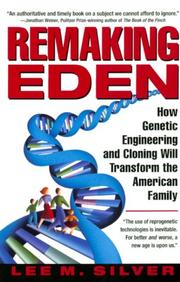
ISBN: 0380792435 Year: 1997 Publisher: New York Bard
Abstract | Keywords | Export | Availability | Bookmark
 Loading...
Loading...Choose an application
- Reference Manager
- EndNote
- RefWorks (Direct export to RefWorks)
reproductieve technologie (voortplantingstechnologie, medisch begeleide voortplanting, MBV, artificiële voortplanting, kunstmatige voortplanting) --- kloneren (klonen, therapeutisch kloneren, reproductief kloneren) --- technique de reproduction (technique de procréation, procréation médicalement assistée, PMA, procréation artificielle) --- clonage (clonage thérapeutique, clonage reproductif) --- Professional ethics. Deontology --- Sociology of the family. Sociology of sexuality --- Human genetics
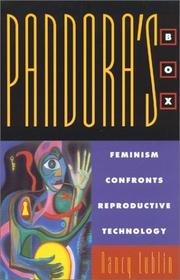
ISBN: 0847686361 084768637X Year: 1998 Publisher: Totowa Rowman & Littlefield
Abstract | Keywords | Export | Availability | Bookmark
 Loading...
Loading...Choose an application
- Reference Manager
- EndNote
- RefWorks (Direct export to RefWorks)
Lublin focuses on the core principles of feminist theory and offers a new framework for creating public policy and social change in the name of gender justice.With the rigor of a dedicated scholar and the passion of a committed activist, Nancy Lublin offers a fresh perspective on the ethical dimensions of providing and using reproductive technologies, including contraception, assisted conception, and antenatal and childbirth interventions. Combining feminist philosophy and legal theory, Lublin considers these issues under a single category that she calls 'technological intervention in the womb.' She addresses the positions of technophiles (who advocate acceptance of technological intervention in the womb as a source of liberation), technophobic feminists (who reject artificial invasions as anti-natural and anti-women), and other feminists who have argued that technological intervention in the womb should be legal and available to women because freedom of choice should be gender-neutral. Lublin identifies core principles that are common to a kaleidoscope of feminist theories, and she argues that a materialist feminism provides the most effective framework for establishing public policy and creating social change in the name of gender justice.
Human reproductive technology --- Feminism. --- Procréation médicalement assistée --- Féminisme --- Moral and ethical aspects --- Social aspects --- Aspect moral --- Aspect social --- -reproductieve technologie (voortplantingstechnologie, medisch begeleide voortplanting, MBV, artificiële voortplanting, kunstmatige voortplanting) --- feminisme (feministische visie) --- #SBIB:014.GIFTSOC --- #SBIB:316.346H10 --- #SBIB:314H232 --- #SBIB:314H233 --- Assisted human reproduction --- Assisted conception --- Conception --- Human assisted reproduction --- Human reproduction --- Medical technology --- Reproductive technology --- technique de reproduction (technique de procréation, procréation médicalement assistée, PMA, assistance médicale à la procréation, AMP, procréation artificielle) --- féminisme --- Vrouwenproblematiek, feminisme: algemeen --- Vruchtbaarheid --- Geboorteregeling --- Technological innovations --- Procréation médicalement assistée --- Féminisme --- Feminism --- reproductieve technologie (voortplantingstechnologie, medisch begeleide voortplanting, MBV, artificiële voortplanting, kunstmatige voortplanting) --- Emancipation of women --- Feminist movement --- Women --- Women's lib --- Women's liberation --- Women's liberation movement --- Women's movement --- Emancipation --- Social movements --- Anti-feminism
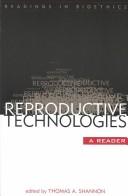
ISBN: 0742531511 0742531503 9780742531512 Year: 2004 Publisher: Lanham Rowman & Littlefield Publishers
Abstract | Keywords | Export | Availability | Bookmark
 Loading...
Loading...Choose an application
- Reference Manager
- EndNote
- RefWorks (Direct export to RefWorks)
As part of the Readings in Bioethics series, this volume collects critical essays by leading scholars on reproductive technologies, abortion, in vitro fertilization, prenatal diagnosis, and cloning.Over a decade ago the field of bioethics was established in response to the increased control over the design of living organisms afforded by both medical genetics and biotechnology. Since its introduction, bioethics has become established as an academic discipline with journals and professional societies, is covered regularly in the media, and affects people everyday around the globe. In response to the increasing need for information about medical genetics and biotechnology as well as the ethical issues these fields raise, Sheed & Ward proudly presents the Readings in Bioethics Series. Edited by Thomas A. Shannon, the series provides anthologies of critical essays and reflections by leading ethicists in four pivotal areas: reproductive technologies, genetic technologies, death and dying, and health care policy. The goal of this series is twofold: first, to provide a set of readers on thematic topics for introductory or survey courses in bioethics or for courses with a particular theme or time limitation.Second, each of the readers in this series is designed to help students focus more thoroughly and effectively on specific topics that flesh out the ethical issues at the core of bioethics. The series is also highly accessible to general readers interested in bioethics. This volume collects critical essays by leading scholars on reproductive technologies, abortion, in vitro fertilization, prenatal diagnosis, and cloning. Included in this volume are David Adamson, James P. Toner, Thomas A. Shannon, Bonnie Steinbock, Laura A. Schieve, Richard J. Paulson, G. Pennings, Thomas H. Murray, Lori B. Andrews, J. M. Phillips.
Reproductive technology --- Reproductive Techniques --- ethics --- reproductieve technologie (voortplantingstechnologie, medisch begeleide voortplanting, MBV, artificiële voortplanting, kunstmatige voortplanting) --- sekseselectie (geslachtsselectie) --- aids (HIV) --- kloneren (klonen) --- Assisted reproduction --- Reproduction --- Biotechnology --- ethics. --- technique de reproduction (technique de procréation, procréation médicalement assistée, PMA, assistance médicale à la procréation, AMP, procréation artificielle) --- sélection de sexe (choix du sexe) --- sida (VIH) --- clonage --- Technological innovations --- General ethics --- Gynaecology. Obstetrics --- Algemene ethiek --- Gynaecologie. Obstetrica --- ART (Assisted reproductive technology) --- Assisted reproductive technology --- Reproductive techniques --- Reproductive technology - Miscellanea --- Reproductive Techniques - ethics --- Ethics --- Book --- Courses
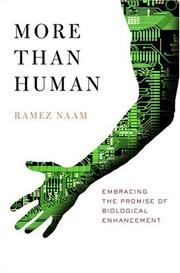
ISBN: 0767918436 Year: 2005 Publisher: New York Broadway books
Abstract | Keywords | Export | Availability | Bookmark
 Loading...
Loading...Choose an application
- Reference Manager
- EndNote
- RefWorks (Direct export to RefWorks)
A man, blind for twenty years, can see when he puts on a pair of glasses connected to electrodes in his brain. & Gene therapy allows a young woman born with 'bubble boy' disease to live normally among her peers. & Life-extension techniques promise to increase human life span by forty years or more. It sounds like the stuff of science fiction, but these are true phenomena that have recently become hot topics in mainstream media. But while technology is enhancing the lives of many, it has also created a host of controversial capabilities, ranging from cloning to genetic engineering. Distilling the most cutting-edge achievements being made in labs around the world, MORE THAN HUMAN offers an exciting tour of the way technology is impacting our lives. Throughout this remarkable trip, Ramez Naam shares an impassioned vision for the future, with revealing insight into the ethical dilemmas posed by twenty-first-century science. Encouraging us to celebrate rather than fear these innovations, his powerful book separates fact from myth with elegant lucidity, arguing that these controversial technologies have the power to transform the human race for the better. MORE THAN HUMAN' 'offers much-needed wisdom in the raging debates between technophobes and technophiles, and everyone else seeking to understand the marvelous possibilities that arise when mind meets machine.
061 Ethische problemen --- 090 Exacte wetenschappen --- biomedische technologie --- verbetergeneeskunde (mensverbetering) --- genetische engineering (manipulatie) --- levensverwachting (levensduur) --- reproductieve technologie (voortplantingstechnologie, medisch begeleide voortplanting, MBV, artificiële voortplanting, kunstmatige voortplanting) --- kloneren (klonen, therapeutisch kloneren, reproductief kloneren) --- neurowetenschappen --- technologie biomédicale --- médecine de l'amélioration (médecine d'amélioration) --- génie génétique (ingénierie génétique) --- espérance de vie (longévité, durée de vie) --- technique de reproduction (technique de procréation, procréation médicalement assistée, PMA, procréation artificielle) --- clonage (clonage thérapeutique, clonage reproductif) --- neurosciences --- Genetic engineering --- Human reproductive technology --- Medical genetics

ISBN: 1417501022 1283904365 1846424348 9781417501021 9781843100843 1843100843 9781846424342 9781843100850 1843100851 9781846424342 9781283904360 Year: 2004 Publisher: London New York Jessica Kingsley Publishers
Abstract | Keywords | Export | Availability | Bookmark
 Loading...
Loading...Choose an application
- Reference Manager
- EndNote
- RefWorks (Direct export to RefWorks)
This is a comprehensive guide to the place of third party assisted conception within health care provision, drawing on ethical and religious standpoints as well as political and economic factors. Blyth and Landau have brought together contributors to consider the social, legal and ethical aspects of assisted conception in thirteen countries.
Human reproductive technology --- Assisted conception --- Assisted human reproduction --- Assisted human reproductive technology --- Conception --- Human assisted reproduction --- Human assisted reproductive technology --- Human reproduction --- Medical technology --- Reproductive technology --- Law and legislation --- Moral and ethical aspects --- Social aspects --- Technological innovations --- ethiek (ethische aspecten) --- familierecht --- reproductieve technologie (voortplantingstechnologie, medisch begeleide voortplanting, MBV, artificiële voortplanting, kunstmatige voortplanting) --- ethique (aspects ethiques) --- droit des familles --- technique de reproduction (technique de procréation, procréation médicalement assistée, PMA, procréation artificielle)
Book
ISBN: 1855210223 Year: 1991 Publisher: Aldershot Dartmouth
Abstract | Keywords | Export | Availability | Bookmark
 Loading...
Loading...Choose an application
- Reference Manager
- EndNote
- RefWorks (Direct export to RefWorks)
In this book the author looks at what rights - if any - people have in the areas of reproduction and the right to found a family. If these rights exist, she then proceeds to discuss whether there is any moral, social or legal justification for hindering people from establishing a family.
Family law. Inheritance law --- Gynaecology. Obstetrics --- Human reproductive technology --- Procréation médicalement assistée --- Law and legislation --- Moral and ethical aspects --- Droit --- Aspect moral --- reproductieve technologie (voortplantingstechnologie, medisch begeleide voortplanting, MBV, artificiële voortplanting, kunstmatige voortplanting) --- draagmoederschap (zwangerschap-voor-een-ander, draagmoeder, surrogaatmoeder) --- technique de reproduction (technique de procréation, procréation médicalement assistée, PMA, assistance médicale à la procréation, AMP, procréation artificielle) --- maternité de substitution (grossesse de substitution, gestation pour autrui, mère-porteuse, mère de substitution) --- Procréation médicalement assistée --- Reproductive rights --- Medical laws and legislation --- Reproductive freedom --- Sexual rights --- Abortion --- Birth control --- Contraception --- Human reproduction --- Involuntary sterilization

ISBN: 184014825X 9781840148251 Year: 1999 Publisher: Aldershot: Brookfield, Vt.: Ashgate,
Abstract | Keywords | Export | Availability | Bookmark
 Loading...
Loading...Choose an application
- Reference Manager
- EndNote
- RefWorks (Direct export to RefWorks)
Addresses ethical issues such as: the effects of the technicalization of reproduction; the moral status of the embryo; the validity of protecting the human genome; the concept of disease in genetic diagnosis and therapy and aspects of distributive justice. (Ashgate) This is the second edited volume from the European Network for Biomedical Ethics. It deals with interdisciplinary approaches to pre-implantation diagnosis (PID) and germline gene therapy across the fields of medicine, human genetics, philosophy, theology and social science. It addresses ethical issues such as: the effects of the technicalisation of reproduction; the moral status of the embryo; the validity of protecting the human genome; the concept of dissease in genetic diagnosis and therapy; and aspects of distributive justice.
Human reproductive technology --- -Preimplantation genetic diagnosis --- -#GBIB:CBMER --- reproductieve technologie (voortplantingstechnologie, medisch begeleide voortplanting, MBV, artificiële voortplanting, kunstmatige voortplanting) --- genetica (genen) --- Preembryo diagnosis --- Preimplantation diagnosis --- Prenatal diagnosis --- Assisted human reproduction --- Assisted conception --- Conception --- Human assisted reproduction --- Human reproduction --- Medical technology --- Reproductive technology --- Moral and ethical aspects --- technique de reproduction (technique de procréation, procréation médicalement assistée, PMA, procréation artificielle) --- génétique (gènes) --- Technological innovations --- Preimplantation genetic diagnosis --- #GBIB:CBMER --- Assisted human reproductive technology --- Human assisted reproductive technology --- Preimplantation genetic diagnosis - Moral and ethical aspects - Congresses --- Human reproductive technology - Moral and ethical aspects - Congresses
| Listing 1 - 10 of 36 | << page >> |
Sort by
|

 Search
Search Feedback
Feedback About UniCat
About UniCat  Help
Help News
News